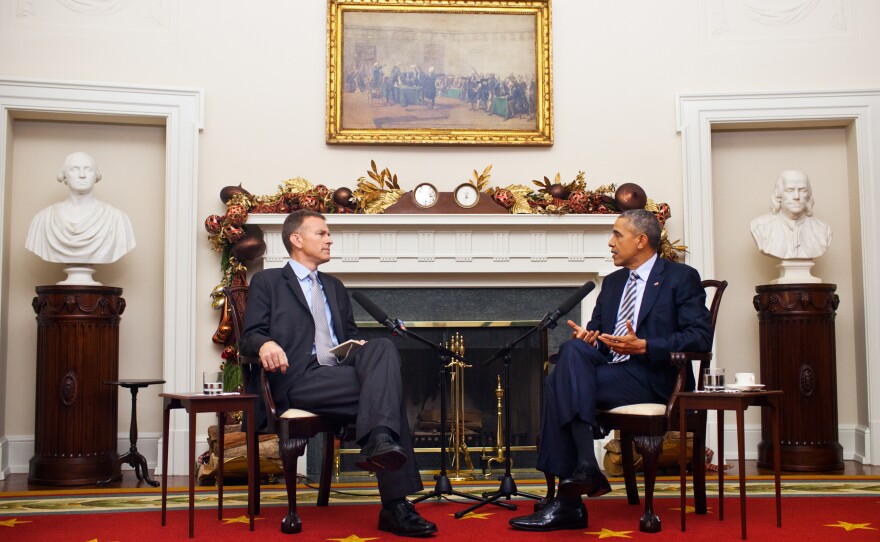Stressing that his administration has "been at this for a long time," President Obama launched a forceful defense of his strategy against ISIS in a year-end interview with NPR. He makes "no apologies," he said, for wanting to target terror groups "appropriately and in a way that is consistent with American values."
Speaking with Steve Inskeep, host of Morning Edition, Obama also urged Americans to "keep things in perspective" when it comes to ISIS, though he says he understands "why people are worried."
"This is not an organization that can destroy the United States," he said, nor is it a "huge industrial power" that poses great risks to the U.S. "institutionally or in a systemic way. But they can hurt us, and they can hurt our people and our families."
Here's how he explained why remembering "who we are" will lead to ISIS's defeat:
Obama added that while ISIS, which he refers to as ISIL, should be taken "seriously," domestic terrorism acts have killed at least as many Americans "as those who were promoted by jihadists." Since Sept. 11, 2001, 45 people have been killed in the United States at the hands of Islamist extremist-inspired terrorists, and 48 have been killed in domestic terrorist attacks, according to a count from the New America Foundation.
Though Obama expressed deep confidence in his approach to fighting ISIS, he is facing a country with just as much criticism of that strategy — only 30 percent of Americans surveyed in a recent Gallup Poll approve of his handling of ISIS.
He said he understands where some of that sentiment comes from and that people are legitimately concerned about terrorism — though he says that fear is fueled in part by the media. "If you have been watching television for the last month, all you have been seeing, all you have been hearing about is these guys with masks or black flags who are potentially coming to get you," he said.
He also believes there was a failing on his administration's part in not better informing the public of action that has been taken to fight ISIS.
"So if people haven't seen the fact that in fact 9,000 strikes have been carried out against ISIL, if they don't know that towns like Sinjar that were controlled by ISIL have been taken back, or that a town like Tikrit, that was controlled by ISIL, now has been repopulated by previous residents, then they might feel as if there is not enough of a response," he said.
Obama also addressed the criticism from Republican presidential candidates, who have hit at his strategy frequently and forcefully on the campaign trail and in debates. The president's name came up at least 35 times in last week's Republican debate in relation to national security or ISIS. Diverging from the president, some called for leaving Syria's Bashar Assad in power to protect the country from falling to ISIS, while others pressed for widespread bombing of regions controlled by ISIS. In a year-end news conference last Friday, Obama reiterated that for the sake of stability in the region, he believes Assad must go.
Speaking to NPR, Obama responded to those strategies, saying that more bombs are not the answer. "Well, when you listen to them, though, and you ask, 'Well, what exactly are you talking about?' 'Well, we are going to bomb more,' " he said. "Well, who is it you are going to bomb? Where is it that you are going to bomb? When you talk about something like carpet-bombing, what do you mean?"
"If the suggestion is that we kill tens or hundreds of thousands of innocent Syrians and Iraqis, that is not who we are," the president continued. "That would be a strategy that would have enormous backlash against the United States. It would be terrible for our national security."
The overall criticism from the Republican candidates boils down to a sentiment that Obama isn't showing enough strength against ISIS. At the Republican debate last week, Ted Cruz said, "ISIS is gaining strength because the perception is that they're winning. And President Obama fuels that perception." Marco Rubio blamed the president for "outsourcing" foreign policy.
Obama, as he often has during his presidency, used a long-game defense. The one piece of advice he would leave the next president when it comes to battling ISIS, he said, is that it's "important not just to shoot but to aim."
Obama did have rare praise, though, for one GOP presidential candidate.
"It is important in this seat to make sure that you are making your best judgments based on data, intelligence, the information that's coming from your commanders and folks on the ground, and you're not being swayed by politics," Obama said.
"What's interesting is that most of the critics have not called for ground forces," he said. "To his credit, I think Lindsey Graham is one of the few who has been at least honest about suggesting 'here is something I would do that the president is not doing.' He doesn't just talk about being louder or sounding tougher in the process."
Listen to more of NPR's interview with President Obama this week on Morning Edition.
Copyright 2015 NPR. To see more, visit http://www.npr.org/.






